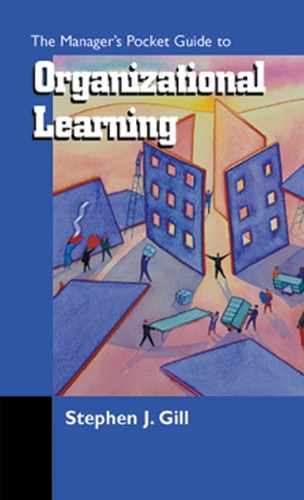![]()
Organizational Learning
and Individual Training
Organizational learning does not refer to training events such as classes, workshops, and seminars. We automatically think that attending a workshop, reading professional material, listening to or watching taped presentations, or participating in a computer-based program will produce workplace learning. This notion stems from an old paradigm of instruction that learning must be structured and instructor-directed and be based on new information from an expert. This way of thinking denies all of the various ways in which people actually learn in the workplace. In fact, employees learn most of what they need to know from co-workers, on the job.
Employees do not need to participate in training programs in order to learn. Training events might contribute to individual learning, but they are not sufficient for individual, team, or organizational success because they are not generally linked to the business objectives and strategic goals of the organization. The information conveyed is not necessarily applied in the workplace, and the events rarely involve everyone in the organization who needs the learning. The content is often not central to the work of employees, either. Training is usually done on an occasional basis; learning, however, has to take place continually. It needs to be ongoing and constant.
Organizational learning is the result of an ongoing process that includes the following:
1. Assimilating information.
2. Translating that information into knowledge.
3. Applying that knowledge to real needs.
4. Receiving feedback to revise the information and reshape the knowledge.
Training programs might contribute to organizational learning, but they are not sufficient partly because training occurs at only brief points in time. Learning, when the organization is receptive, is continuous.
If the learning in your organization is to be effective, everyone within it must share and internalize a common set of beliefs. Check your readiness for organizational learning by asking yourself whether you agree or disagree with each of the following principles of organizational learning listed on page 7.
These beliefs must be commonly shared by employees as well as by customers and suppliers. Brinkerhoff and Gill refer to these beliefs as learning alliances. Over time, effective learning alliances will result in accumulated knowledge, which is among the most valuable assets of any company—as important as property and inventory, equipment and machines, products and services, and the loyalty of employees and customers.

